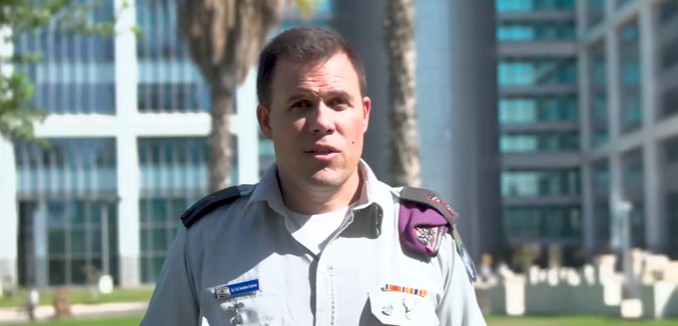In the latest episode of ‘Tipping Point’, The Israel Project’s weekly podcast, Lt.-Col. Jonathan Conricus, the new head of the international media branch at the IDF spokesperson’s unit, discussed the fragile situation on the Syrian border, the prospects of war with Hezbollah, and the significance of the Hamas-Fatah reconciliation.
Addressing the situation in the region, Conricus warned that Iran is striving for hegemony and is on the verge of establishing a direct land corridor from Tehran through Baghdad to the Mediterranean, which would drastically change the security situation in the region.
“The aggressive export that Iran is doing of their specific brand of violent extremism and terrorism to many countries – to Lebanon through Hezbollah, to Syria through various proxies, to Yemen and other regions – it’s a pattern of exporting very toxic and dangerous ideologies around the Middle East, trying to achieve some kind of dominance,” he explained.
Conricus pointed out that Iranian and Israeli interests in Syria couldn’t be further apart, with one party trying to stabilize the situation and saving lives, and the other thriving on chaos and destruction. “It’s interesting to see the contrast of what Iran is doing in Syria and of what Israel is doing on the Golan Heights,” he said, adding “What the IDF is involved in is ‘Operation Good Neighbor’, providing humanitarian aid for more than a year and a half now. More than 3,000 Syrians have been given medical attention, sometimes even life-saving procedures by either Israeli military doctors or in hospitals.”
Moving on, Conricus addressed the prospect of a third Lebanon War. “Hezbollah is in clear violation of UN Security Council Resolution 1701; they are stockpiling weapons in southern Lebanon,” he stated. Conricus continued, “They have their missiles and rockets, approximately 120,000 of those, within the civilian population in Lebanon and aiming their rockets at Israeli civilians, intentionally doing so in order to extort pressure on the Israeli leadership.”
The IDF spokesperson further accused the terrorist organization of war crimes. “In southern Lebanon, they have dug underneath houses, schools, hospitals, mosques, and U.N facilities, using them for military purposes, which is a violation of the law of armed conflict.”
Conricus said the IDF was ready to respond to all eventualities. “We are prepared for different scenarios,” he stressed. “There would be a very heavy price for any act of aggression, whether against the IDF, or, for sure, against civilians, and I think Hezbollah knows this. And I also think Hezbollah is aware of the price they would pay, if they were forced by their Iranian masters to attack Israel.”
But Conricus also acknowledged that Hezbollah is now a more formidable enemy. “For sure Hezbollah has evolved,” he admitted. “What we see today is that Hezbollah is accountable in Lebanon. They bear responsibility vis-à-vis the Lebanese population. They are part of government, they wield significant political power, they have the strongest military force inside Lebanon.” He added, “The bottom line is that Hezbollah has developed. They have become not only a terrorist organization, but an organization that is also political and that has civilian responsibilities.”
When asked if Hamas is building on the experience of Hezbollah, Conricus confirmed that the group “has been mimicking Hezbollah for decades,” mentioning “combat tactics, use of human shields in combat, use of their own civilians as a protection against IDF, and the targeting of Israeli civilians with rockets and missiles.”
Referring to the recent reconciliation talks between Hamas and Fatah, Conricus stated that “words are cheap; talk is cheap. From the IDF’s perspective nothing changes until we see a different approach to the Hamas charter – how they view the state of Israel, if they recognize Israel’s right to exist, lay down their arms or transfer them to the authority of the PA.”
Conricus concluded by praising Israel’s soft power skills. “Many times, Israel suffers from a reputation that is totally unwarranted and unfair,” he said, stressing that “events like the Israeli aid mission to Mexico is an excellent example that shows the good heart, and good intentions, and excellent capabilities of the state of Israel and the IDF to reach out to people, or countries, of cities in need, like search and rescue.”
He said his ambition as the IDF’s new spokesperson is to “change the perception how people see the IDF.” Conricus continued, “There are many non-Israeli [military officials], who said very clearly that the IDF is, by far, the most moral military in the world and does much more than any other military in trying to minimize collateral damage or injuring non-combatant. We do that while our soldiers are under fire.”
Conricus was the first Israeli to hold a position at the UN’s Department of Peacekeeping Operations in Manhattan, where he was responsible for providing assessments of military intelligence and information pertaining to various peacekeeping operations around the world. He received a service medal at the UN in June 2015.
The complete interview is embedded below.
[Photo: Israel Defense Forces / YouTube ]




